Marian Vosumets is an Estonian filmmaker, journalist and founder of the independent production house, Lola Productions. Having forged a career in journalism in Estonia’s capital, Tallinn, where she made several documentary broadcasts, she has since turned her attention to filmmaking. Now based in London, Marian is currently studying on our 1-year MA Filmmaking course at LFA.
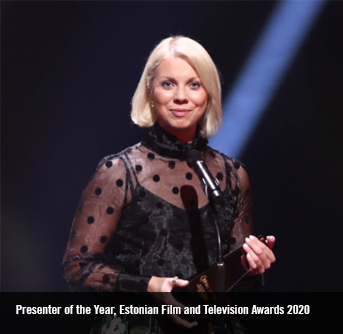
Marian wrote and directed her debut feature-length documentary, ‘The Body Fights Back’, in 2019, which follows the lives of several individuals as they navigate the paradoxes of diet culture.
Featuring exclusive footage from London’s contemporary anti-diet movement, and fascinating personal archives, the film offers a unique insight into the complexity of eating disorders, body image struggles and most importantly, the socio-economic realities of health.
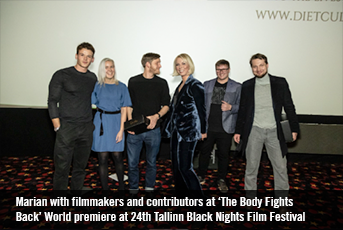
The documentary has found international acclaim and distribution, and has opened up a diverse and necessary conversation, on social media and beyond, about modern dieting trends and their impact on people’s lives.
The film had its world premiere at the 24th Tallinn Black Nights Film Festival in 2020, and was also selected at The Impact DOCS Awards 2021, and the North West Fest 2021. The UK premiere took place at Peckham Levels in London in February 2022, in collaboration with the Anti Diet Riot Club. It is now available to stream on major platforms in the UK, Ireland, US, Canada and Australia, and will soon be distributed across Europe.
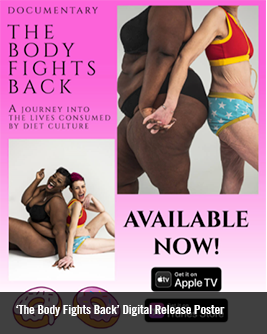
Find out how to watch ‘The Body Fights Back’ by clicking here.
We found some time in Marian’s busy schedule to catch up with her about her fascinating and varied career to date, including how she got into filmmaking, how she finds life at LFA on our MA Filmmaking course, as well as a deep dive into the inspiration, and challenges, behind her impactful documentary. Read the inspiring interview with Marian below.
Can you tell us about your background in filmmaking? What was your journey into filmmaking, and why is it something you wanted to pursue?
My background is in broadcast journalism and I think it’s fair to say I got into film by accident. By 2019 I had produced a number of TV documentaries on topics ranging from Brexit protests in the UK to social unrest in Israel. It had given me the confidence to pursue even bigger, more personal topics and look beyond daily news reporting which had until then been my main profession. I used to split my time between Tallinn and London around that time, digging into the UK’s growing feminist movement around body liberation and against diet culture, which I found fascinating because the conversation was entirely absent in Estonia. What was initally planned as a short series turned into a feature documentary, pushing me further into filmmaking territory. I set up a production company to house the projects that started to deviate from my broadcasting work.
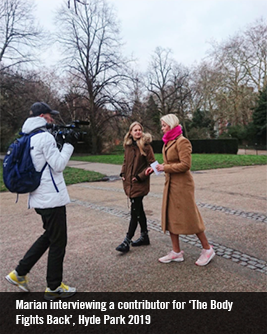
You’re studying the MA Filmmaking course at LFA. Why did you want to study a masters degree in filmmaking?
"Independent filmmaking will only take you so far. I think ‘The Body Fights Back’ earning acclaim and finding international distribution gave a strong impetus for change. My journalism career in Tallinn had become somewhat complacent and predictable, to the point where I was craving new challenges. London on the other hand was a city full of stories and excitement that I had grown to love dearly during the making of ‘The Body Fights Back’. It felt like the right time to jump in at the deep end and pursue a formal education in filmmaking."
Why did you choose LFA for your studies?
"LFA has a great student to tutor ratio and a wide network of active filmmakers who share their firsthand knowledge with us. It’s been incredibly valuable chatting to our cinematography and directing tutors on set, or hearing what it’s like to work on Channel 4 and BBC productions as an editor or sound recordist. It’s a very supportive environment. The fact it was the only film school in the UK founded and run by women was no less important. There’s still a long way to go before the female gaze will replace certain outdated standards in cinema and reach the level of visibility it deserves. I’m glad the LFA is committed to welcoming students from very diverse backgrounds."
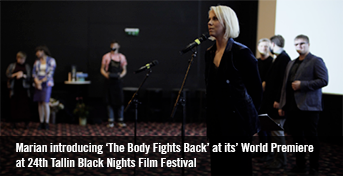 What has been the most important thing you’ve learned so far on your course?
What has been the most important thing you’ve learned so far on your course?
"The value of networking; fostering good relationships with people is everything. Filmmaking can be a very ambiguous industry. As much as we aspire to the ideal of equal opportunities, it still remains a strictly competitive space centered around relationships and mutual favours. This is especially true in the field of producing which is all about the skill to negotiate, compromise and sell visions. I sometimes joke about this by comparing it to selling a can of hot air with enthusiasm and conviction – that’s essentially what pre-production feels like. Composing frames and rigging lights comes later down the line, you need to get to that point first. I appreciate that the LFA has given me a practical understanding of the more technical roles as well, and how to orchestrate a narrative film production which cannot be as spontaneous and agile as working with a skeleton crew on your DIY documentary. Experiencing a variety of film sets, work dynamics and creative roles has greatly contributed to me becoming a better producer, writer and director."
What are you most looking forward to on your course?
"I am currently in the middle of producing my graduation film. We have just wrapped our Collaborative Film Project module, producing nine short films in three months, and will be entering our final term very soon. I am looking forward to working with my favourite coursemates over June and July, shooting and editing a screenplay I wrote in January, without even knowing it would become my graduation project. I’m also excited about the workshops, masterclasses and career meetings scheduled for us in the coming months. It’s going to be a busy summer."
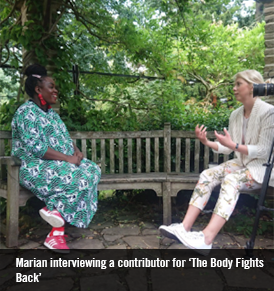 You wrote and directed the documentary film ‘The Body Fights Back’, which delves into the lives of people consumed by diet culture. What attracted you to this idea, and why was this an important story for you to tell?
You wrote and directed the documentary film ‘The Body Fights Back’, which delves into the lives of people consumed by diet culture. What attracted you to this idea, and why was this an important story for you to tell?
"I’ve always been fascinated by subcultures and countermovements, I think they reflect and magnify some of the most troubling trends in society. Diet culture is an insidious widespread mentality whereby we equate thinness to good health. We see that all too often this results in developing problematic relationships to food and training. It’s a set of dogmatic beliefs and practices, perpetuated by wellness influencers and an entire industry dedicated to making a profit out of people’s insecurities.
It’s a specific form of injustice that entered into my consciousness when talking to people in certain feminist communities who were actively pushing against it. It’s pretty evident that physically attractive people are offered better positions and more privilege, be it in the workplace or elsewhere. I remember at one point re-evaluating my entire life through the lens of beauty standards, questioning every opportunity I’d ever been given. It felt incredibly liberating to discover spaces where people would speak up about this and say you know what, self-imposed restriction is not a fun way to live life. Having suffered from disordered eating and excessive exercise myself in my mid 20s, it all just suddenly clicked. The journalist in me was astounded that nobody had documented the work of these amazing rebels in the forefront of this particular movement. It felt momentous, right in front of me was a story worth telling."
TRAILER The Body Fights Back OUT NOW [Captioned] from The Body Fights Back on Vimeo.
What was the most challenging thing you encountered when making the documentary, and how did you overcome it?
"I lived in Tallinn at the time, so our monthly travels to London in 2019 became quite taxing. Fortunately, I was able to operate with a small and flexible crew, certain events were captured by a London-based cinematographer who was pretty much always on standby. Lots of coordinating and logistics to keep things running.
The mental and moral challenge came with the interviews. Regardless of skill and experience, you can never fully prepare for the uncomfortable emotional moments when digging in someone’s past. And granted there were many. A young woman’s seven year battle with anorexia and frequent hospital admissions or a man’s suicidal leanings around his binge eating disorder are intense topics to navigate.
The film also touches on sexual assault and abusive parenting, shedding light on the less evident factors that can lead to developing an eating disorder. That is also why we shouldn’t be too quick to judge people in larger bodies for example, someone might be turning to food for comfort because it’s the only coping mechanism they know. It takes a great deal of compassion to hold space for feelings of shame, guilt and confusion when interviewing people on camera about such things."
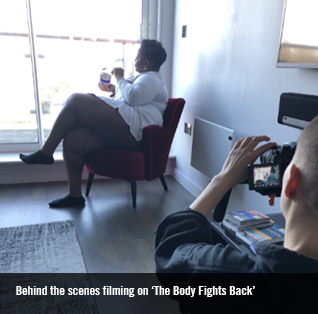
Why is documentary filmmaking an important form of storytelling for you?
"Non-fiction to me is life as it unfolds. I remember back then being much less concerned with the cinematic outcome and placing all my focus on stitching the six individual stories into one cohesive narrative. Thankfully Fidelia Regina Randmäe and Norman Tamkivi are brilliantly talented cinematographers, translating the vision into a series of beautiful shots as we went along.
I think The Body Fights Back highlights brilliantly, if not disturbingly, the universal fears and anxieties we have about our bodies. The documentary format allowed me to juxtapose the experiences of people who would otherwise never find each other in the same room. It’s like a saturated slice of life."
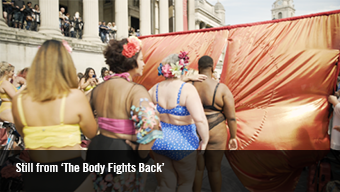
What has the response been like to the film?
"On the night of our premiere at Tallinn Black Nights Film Festival in 2020, we saw somewhat of a queue of people lining up, all eager to share their own stories with the cast and crew. The response on social media continues to be vast, often heart-breaking, especially from young women. I think the film offers permission to open up without fearing judgement and I hope these conversations extend beyond the scope of this film.
‘The Body Fights Back’ is currently being shown in a number of clinics in the US and Canada that specialise in treating eating disorders. Theatrical release in Estonia last summer saw a number of private screenings for healthcare professionals and public health experts, including the Ministry of Health and Labour. Mrs Kersti Kaljulaid, the United Nations Ambassador for Women’s and Children’s Health and former President of Estonia, attended another screening with her staff and advisers.
The UK premiere in February was hosted in collaboration with the Anti Diet Riot Club community who were some of our closest contributors. It was one of the best and most hilarious Q&As I’ve done with this film. I think the message has spread far and wide which is what you ultimately want for a documentary on social and mental health issues."
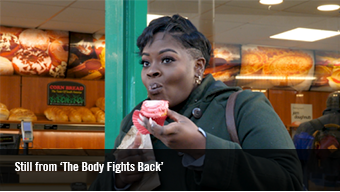
The film is currently streaming on Apple TV and iTunes and will soon be available on Netflix in the UK. Can you tell us about how you went about getting this kind of distribution for the film?
"The film got picked up by Canadian distribution company Syndicado Film Sales after its premiere at Black Nights. It took a few months of pitching however, as it’s very rare for an independent film with no prior deals to get recognised by international sellers. We took advantage of the fact it was selected as the opening film of the festival’s prestigious Trending Programme, known for showcasing themes of social and cultural relevance. The first agent soon went on to sell the film to their partners at Gravitas Ventures in the US, and Madman Entertainment in Australia. Distribution is a bizarre and vast business that I’m yet to fully comprehend. For some reason it took nearly two years for it to land on UK platforms. Then came the offer from Netflix Europe. It will be a while until Netflix release it though, so head to Prime and iTunes first."
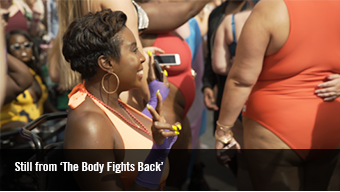
What advice would you have for others, like you, who want to bring their own story to life?
"Start by being clear about your intention. Do you care about the subject enough to see it through? Are you making the film to impress yourself or someone else? Would you devote your time, energy and finance to the cause even if cameras were not involved? If it comes from the heart, go for it. It will show, the audience can tell.
The first steps will always feel harrowing because you’re unsure if you possess the expertise and agency to investigate your topic, but you have start somewhere. My only real advice is to make a film that you yourself would watch. Figure out your angle and sell it fiercely. If you’re uncomfortable promoting your work, get someone else to do it. You ultimately want an audience so think about the film’s niche and relevance well in advance."
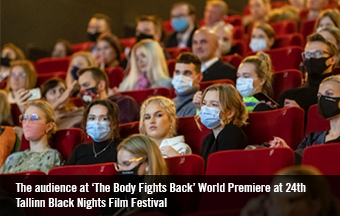
What are your ambitions for your future filmmaking career?
"It would be great to join an established production company after graduation. It would have to be a team whose work ethic and values align with my own, that’s where the magic happens. I feel confident and excited about producing, pitching and development; everything connected to advocating for a cause. The long-term plan is to produce both commercial and arthouse films and continue writing on the side."
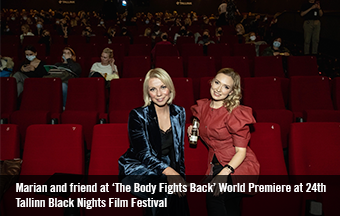
Do you have any other projects in the works that you can tell us about?
"My graduation film ‘Skin', directed by Deven Ahire, will be coming out in November. The following plan is to develop the short film into a feature script and pitch for funding at upcoming festival markets. ‘Skin’ is a brutal modern-day drama about romance in late capitalism, the absence of intimacy in sexual relationships and the ways in which we perform gender. I’m thrilled to be shooting this film with our wonderful LFA crew and a remarkable cast. I have zero doubts that Skin will be going places, giving the LFA another reason to be proud for bringing together such diverse talent from across the world."
Find out more about out 1-year MA Filmmaking.
Discover more about ‘The Body Fights Back’.
Follow Marian on social media.
Images published with the permission of Marian Vosumets.
